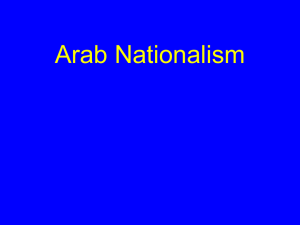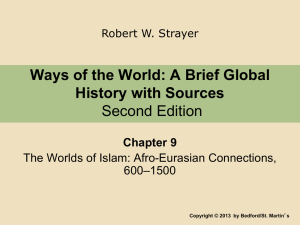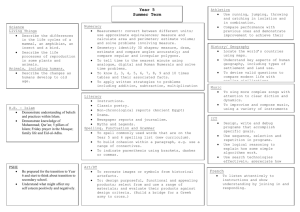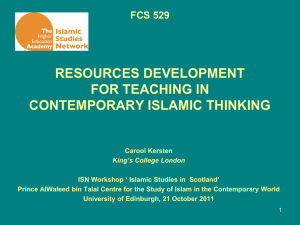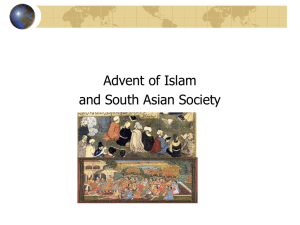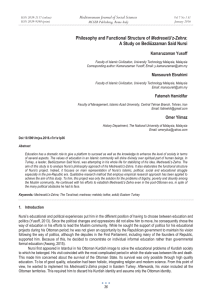Political Islam, Islamism and Modern Islamic Movements
advertisement
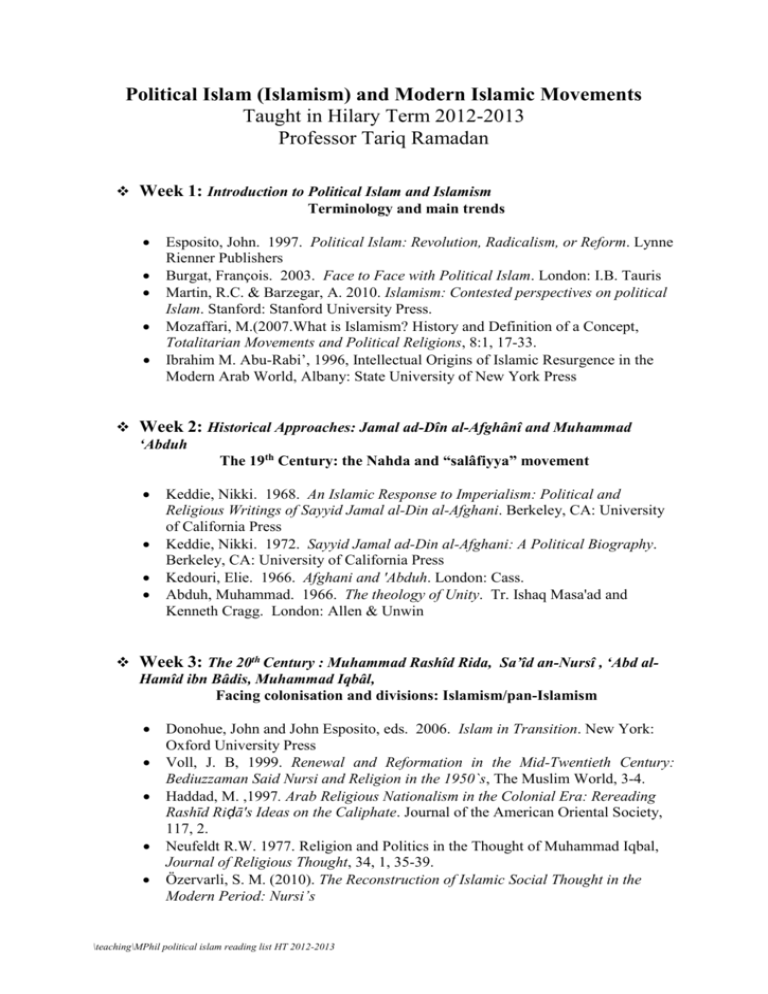
Political Islam (Islamism) and Modern Islamic Movements Taught in Hilary Term 2012-2013 Professor Tariq Ramadan Week 1: Introduction to Political Islam and Islamism Terminology and main trends Esposito, John. 1997. Political Islam: Revolution, Radicalism, or Reform. Lynne Rienner Publishers Burgat, François. 2003. Face to Face with Political Islam. London: I.B. Tauris Martin, R.C. & Barzegar, A. 2010. Islamism: Contested perspectives on political Islam. Stanford: Stanford University Press. Mozaffari, M.(2007.What is Islamism? History and Definition of a Concept, Totalitarian Movements and Political Religions, 8:1, 17-33. Ibrahim M. Abu-Rabi’, 1996, Intellectual Origins of Islamic Resurgence in the Modern Arab World, Albany: State University of New York Press Week 2: Historical Approaches: Jamal ad-Dîn al-Afghânî and Muhammad ‘Abduh The 19th Century: the Nahda and “salâfiyya” movement Keddie, Nikki. 1968. An Islamic Response to Imperialism: Political and Religious Writings of Sayyid Jamal al-Din al-Afghani. Berkeley, CA: University of California Press Keddie, Nikki. 1972. Sayyid Jamal ad-Din al-Afghani: A Political Biography. Berkeley, CA: University of California Press Kedouri, Elie. 1966. Afghani and 'Abduh. London: Cass. Abduh, Muhammad. 1966. The theology of Unity. Tr. Ishaq Masa'ad and Kenneth Cragg. London: Allen & Unwin Week 3: The 20th Century : Muhammad Rashîd Rida, Sa’îd an-Nursî , ‘Abd alHamîd ibn Bâdis, Muhammad Iqbâl, Facing colonisation and divisions: Islamism/pan-Islamism Donohue, John and John Esposito, eds. 2006. Islam in Transition. New York: Oxford University Press Voll, J. B, 1999. Renewal and Reformation in the Mid-Twentieth Century: Bediuzzaman Said Nursi and Religion in the 1950`s, The Muslim World, 3-4. Haddad, M. ,1997. Arab Religious Nationalism in the Colonial Era: Rereading Rashīd Riḍā's Ideas on the Caliphate. Journal of the American Oriental Society, 117, 2. Neufeldt R.W. 1977. Religion and Politics in the Thought of Muhammad Iqbal, Journal of Religious Thought, 34, 1, 35-39. Özervarli, S. M. (2010). The Reconstruction of Islamic Social Thought in the Modern Period: Nursi’s \teaching\MPhil political islam reading list HT 2012-2013 Approach to Religious Discourse in a Changing Society. Asian Journal of Social Science, 38, 532–553. Sahide, V. 2005. Islam in Modern Turkey – An Intellectual Biography of Bediuzzaman Said Nursi. New York: State University of New York Press. Kuru, Z. A. & Kuru, A. T. 2008. Apolitical Interpretation of Islam: Said Nursi's Faith-Based Activism in Comparison with Political Islamism and Sufism, Islam and Christian–Muslim Relations, 19:1, 99-111 Alghailani, S. A. 2011. Ibn Badis and Modernity, Historical and Social Sciences, 17. Iqbal, Muhammad. 1932. The Reconstruction of Religious Thought in Islam. New York: Oxford University Press Week 4: The Muslim Brotherhood in Egypt : Hassan al-Banna, Hassan alHudaybî, Abu al-‘Ala’ al-Mawdudi, Sayyed Qutb Vision and divergences Mitchell, Richard P. 1969. The Society of the Muslim Brothers. Oxford: Oxford University Press Banna, Hasan al-. 1983. Selected Writings. Karachi: International Islamic Publishers Qutb, Sayyid. 1991. Milestones. Delhi: Markazi Maktaba Islami Shepard, W. E. (2003). Sayyid Qutb's Doctrine of "Jāhiliyya", International Journal of Middle East Studies, 35, 4, 521-545. Soage, A.B. (2009). Hasan al-Banna and Sayyid Qutb: Continuity or Rupture? The Muslim World, Hartford Seminary, Uk, Oxford: Blackwell Publishing Ltd Mawdudi, Abu al-‘Ala’ al-. 1974. Towards Understanding Islam. Lahore: Idara Turjuman al-Qur’an Week 5: Iran and Turkey Evolution and Challenges Nasr, Vali. 2007. The Shia Revival: How Conflicts within Islam Will Shape the Future. New York: W. W. Norton Roy, Olivier. 1994. The Failure of Political Islam. Cambridge, Mass: Harvard University Press Shariati, Ali. 1979. Red Shiism. Tehran: The shariati Foundation and Hamdami Publishers Mutahhari, Ayatullah Murtada. 1974. Goal of Life. Foreign Department of Be'that Foundation Someyeh Avenue, Islamic Republic of Iran (http://alislam.org/short/goal/) Bugal, Cihan. 2002. Islamism in Turkey: Beyond Instrument and Meaning. http://sociology.berkeley.edu/public_sociology_pdf/tugal.pps05.pdf Hale, William and Ozbudun, Ergun, 2011, Islamism, Democracy and Liberalism in Turkey: The Case of the AKP, UK: Routledge Ansari, Ali M., 2010. Crisis of Authority: Iran's 2009 Presidential Election, UK: Chatham House. 2 Week 6: Contemporary movements : Before and After the Uprisings in MENA Diversity of movements, trends and strategies: Egypt, Tunisia, Morocco Tamimi, Azzam. 2001. Rachid Ghannouchi: A Democrat Within Islamism. New York: Oxford University Press Willis, Michael J., 2012. Politics and Power in the Maghreb: Algeria, Tunisia and Morocco from Independence to the Arab Spring, UK : C Hurst & Co Publishers Ltd Ramadan, Tariq. 2012. The Arab Awakening: Islam and The New Middle East, UK : Penguin Phillips, A. 2011. War, Religion and Empire – The Transformation of International Orders. Cambridge: Cambridge University Press. Filiu Jean-Pierre, 2011. The Arab Revolution: Ten Lessons from the Democratic Uprising, UK: C Hurst & Co Publishers Ltd Dabashi, Hamid, 2012. The Arab Spring: The End of Postcolonialism, UK: Zed Books Ltd Manhire, Toby, 2012. The Arab Spring: Rebellion, Revolution, and a New World, UK : Guardian Books. Week 7: Postislamism? Roy, Olivier. 1994. The Failure of Political Islam. Cambridge, MA: Harvard UP. Bayat, Asef. 1996. The Coming of a Post-Islamist Society. Critique: Critical Middle Eastern Studies, no. 9: 43-52. Roy, Olivier. 2004. Globalized Islam: The Search for a New Ummah. New York: Columbia UP Kepel, Gilles. Islamism Reconsidered. Harvard International Review. 2000. Hussain, Ghaffar. Post-Islamists in the Arab world. guardian.co.uk, Saturday 12 November 2011. Ramadan, Tariq. 2008. Radical Reform – Islamic Ethics and Liberation. Oxford: Oxford University Press. Week 8: Synthesis, comments and discussion Current situation in the Middle East What about the Islamist movements? Synthesis and conclusions 3



